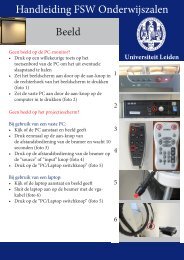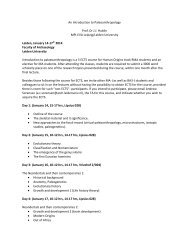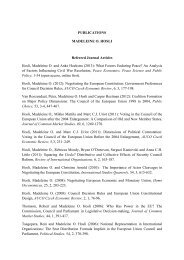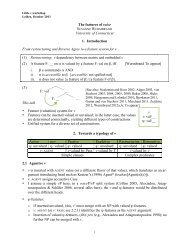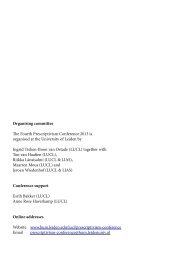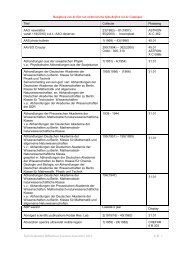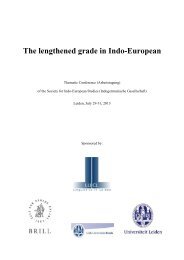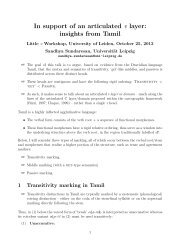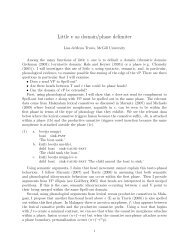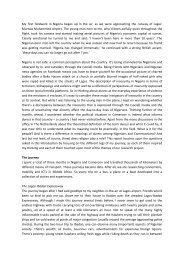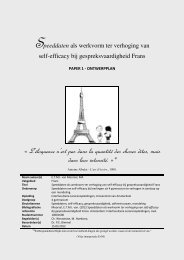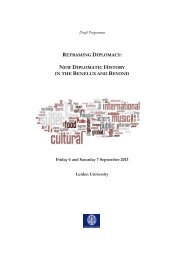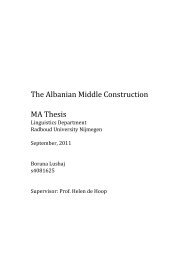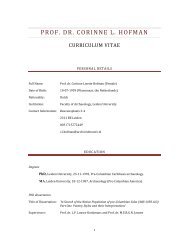Institute for History Annual Report 2010 - O - Universiteit Leiden
Institute for History Annual Report 2010 - O - Universiteit Leiden
Institute for History Annual Report 2010 - O - Universiteit Leiden
Create successful ePaper yourself
Turn your PDF publications into a flip-book with our unique Google optimized e-Paper software.
Migration and Global Interdependence<br />
Description<br />
An important current topic of historical research is<br />
the global interdependence that came about since<br />
the Early Modern period. The widening,<br />
deepening and acceleration of worldwide interconnectedness<br />
is known as globalisation. This<br />
affects all aspects of social life, from the cultural to<br />
the criminal, the financial to the spiritual. In this<br />
research theme we focus on the social and<br />
economic responses to increasing interconnectedness.<br />
Globalisation has many dimensions and can be<br />
studied by distinguishing between extensity,<br />
intensity, velocity and impact. Key themes in this<br />
research cluster are international contacts, interaction<br />
and the effects of interdependencies on<br />
society and economy. We distinguish between the<br />
movement of goods, services, capital, people and<br />
ideas. Geographical emphasis is on Europe and<br />
the United States, but also on the Middle East,<br />
Central Asia and Southeast Asia. What impact did<br />
global connections have on cultures, state<br />
<strong>for</strong>mation, economies and societies? We examine<br />
how people have coped with global interdependence<br />
and how people attempted to control and<br />
manage these processes. This includes the study of<br />
individual (migration) and collective reactions<br />
(institutions, states, EU, multinationals). The research<br />
within this research theme can be divided<br />
<strong>Institute</strong> <strong>for</strong> <strong>History</strong><br />
111<br />
into three sub-themes: (a) migration, membership<br />
regimes and cities; (b) state <strong>for</strong>mation and<br />
frontiers; (c) political economy, networks, and the<br />
role of institutions.<br />
Migration, membership regimes and cities<br />
Research in the field of migration history includes<br />
the mobility of people, settlement processes of<br />
migrants, and, finally, the effects of migration on<br />
state <strong>for</strong>mation and the <strong>for</strong>mation of minorities.<br />
The migration theme is not restricted to a<br />
particular period or region, although the focus is<br />
on the period from the Middle Ages onwards. In<br />
addition, we study the colonisations and conquests<br />
in which the native population was <strong>for</strong>ced<br />
to adapt to the newcomers, resulting in processes<br />
of extinction, marginalisation and creolisation. In<br />
order to study migration the comparative method<br />
(in time and space) is most appropriate. An important<br />
issue is how migrants integrated in new<br />
communities and the role of different political opportunity<br />
structures in the outcome of such processes.<br />
Here we use the new-institutionalist approach<br />
as advocated by scholars as Richard Alba<br />
and Victor Nee, which is well suited <strong>for</strong> global<br />
comparisons of various membership regimes.<br />
Within the migration theme special attention is<br />
paid to differences according to gender. The<br />
importance of gender, as an analytical category, is<br />
studied in combination with class and ethnicity in<br />
relation to migration to the Netherlands in the<br />
period from 1945 until 2000.<br />
Cities and Civil Service



